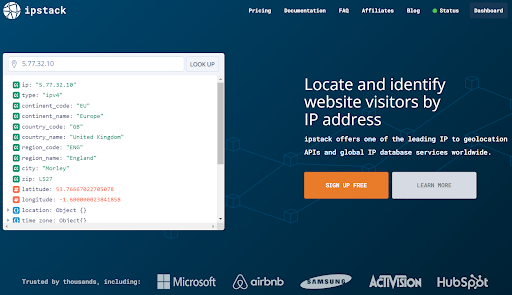
The Future of Location API & What It Means for Developers
Technology is a process that is constantly evolving. Almost every day, there is an innovation that will make human life easier. Especially in the field of technology, we see many services that will directly facilitate human life. One of the most popular technological developments today is the emergence of the location API. Especially web applications frequently use web location APIs.
A location API is essentially tasked with providing developers and businesses with geographic location information that corresponds to the user's IP address. So we can also call it a geolocation API. Although the rapid development of technology has brought the geolocation API into our lives, have you ever thought about what awaits the geolocation API in the future? In this article, we'll cover what the geolocation API awaits in the future. Next, we'll take a closer look at the structure of a geolocation API.
The Future of the Geolocation API

The geolocation API is a basic REST API with many unique benefits to developers. Its future also presents many opportunities for app developers. Using this API with location-based analytics or smart city technologies, for example, provides more dynamic information to app developers, allowing them to offer more accurate and customized services.
Let's take a look at some of the items that await the geolocation API in the future.
Increased Accuracy
With the development of 5G technology, it is inevitable that the accuracy of the location data provided by this API will increase. Developers will be able to provide a perfect application experience to their users with geolocation objects with increased accuracy.
People will prefer applications that use location APIs with increased accuracy. Personalization will increase directly. It is also predicted that the number of domains using this API will gradually increase.
Integration With AR/VR
We know that AR/VR (Augmented Reality and Virtual Reality) will enter our lives more in the near future. Developers will be able to act with a completely different perspective by integrating location APIs into AR/VR applications. A single HTTP request will allow instant location operations in AR/VR applications.
Increased Security
Advances in technology do not always bring good things. As technological products develop and come to the fore, they may be attacked by more attackers. Especially considering its integration with artificial intelligence and 5G technologies, it is thought that location APIs will be more secure against any attack in the future.
Location-Based Metrics and Analytics
Finally, if we think that location APIs will be more secure and more accurate in the future, we can think that they will be used by more applications, especially in future smart city projects. With the location APIs to be used in these projects, location-specific analyses and metrics can be obtained. In this way, necessary location-specific improvements can be made.
What Is the IPstack API?

First of all, define the IPstack API; it is a web service that provides geospatial data corresponding to that IP address. It is used by more than 100,000 developers today.
The location information provided by this API contains very rich data. It contains many data such as primary currency, currency symbol, and location connection information.
Although it responds to requests in JSON format by default, it can also respond to XML format. In this way, it provides a fast integration phase for developers.
This API provides very reliable service and bank-grade security. All data provided or obtained by this API is encrypted with 256-bit SSL encryption.
How Does the IPstack API Retrieve the User's Position?
The IPstack API obtains location data thanks to its large database. Location data of IP address ranges are retrieved from this database, which has millions of address records.
The database full of address data owned by the IPstack API is regularly updated. In this way, it provides the most up-to-date data.
Example of Location Data Provided by the IPstack API
In this step, we will look at how to use the IPstack API quickly. The ipstack API provides many code examples with impeccable documentation.
To use this API, we first need an API key. For this, we choose one of the very convenient subscription plans offered by the IPstack API and sign up.
After obtaining the API key, let's paste the following URL into the browser.
https://api.ipstack.com/5.77.32.10?access_key=YOUR_API_KEY
Then when we go to this URL we will get the following JSON output.
{
"ip": "5.77.32.10",
"type": "ipv4",
"continent_code": "EU",
"continent_name": "Europe",
"country_code": "GB",
"country_name": "United Kingdom",
"region_code": "ENG",
"region_name": "England",
"city": "Morley",
"zip": "LS27",
"latitude": 53.76667022705078,
"longitude": -1.600000023841858,
"location": {
"geoname_id": 2642189,
"capital": "London",
"languages": [
{
"code": "en",
"name": "English",
"native": "English"
}
],
"country_flag": "https://assets.ipstack.com/flags/gb.svg",
"country_flag_emoji": "\ud83c\uddec\ud83c\udde7",
"country_flag_emoji_unicode": "U+1F1EC U+1F1E7",
"calling_code": "44",
"is_eu": true
},
"time_zone": {
"id": "Europe/London",
"current_time": "2023-03-02T09:35:29+00:00",
"gmt_offset": 0,
"code": "GMT",
"is_daylight_saving": false
},
"currency": {
"code": "GBP",
"name": "British Pound Sterling",
"plural": "British pounds sterling",
"symbol": "\u00a3",
"symbol_native": "\u00a3"
},
"connection": {
"asn": 20860,
"isp": "Iomart Cloud Services Limited"
},
"security": {
"is_proxy": false,
"proxy_type": null,
"is_crawler": false,
"crawler_name": null,
"crawler_type": null,
"is_tor": false,
"threat_level": "low",
"threat_types": null
}
Conclusion
In summary, we talked about the future of a location API in this article. Although the future of the Location API looks bright, it is important that the location API you want to use is a service that has the latest technology, is open to innovations, and offers much detailed location-related data.
FAQs
Q: What Is the future of the location API?
A: The future of the Location API looks bright for developers and businesses. With artificial intelligence and 5G technologies, Location API is expected to become faster and more reliable. In this case, it will allow developers and businesses to provide more personalized services to their users.
Q: Why Is the Location API Important?
A: The Location API allows application developers to provide customized services to their users. For example, a travel app recommends nearby attractions using the user's location. These customized recommendations better respond to users' needs and directly increase the use of the app.
Q: How Common Is the Location API to Use?
A: The Location API is actively involved in many applications today. In particular, it is widely used in many types of applications such as news, weather, health, sports, navigation, social media, e-commerce, and location-based games.
Q: Is the IPstack API the Most Popular Location API?
Yes, it is. The IPstack API is used by over 100,000 people and businesses, including Microsoft, Samsung, and Airbnb. It provides detailed location data of an IP address.
Q: Is the Database Used by the Location API Actively Updated?
A: Yes, it is updated regularly. Location data on the world may change, albeit slightly, for various reasons. In particular, today's popular location APIs, such as the IPstack API, check the address data in the databases in a very short time. In this way, they provide their users with the most up-to-date and accurate location data.